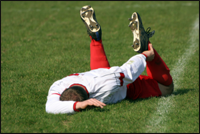 Like many I was shocked to hear of the collapse on the football field of Bolton player Fabrice Muamba. And I’m relieved to hear that, at the time of writing this article, he appears to be showing signs of recovery.
Like many I was shocked to hear of the collapse on the football field of Bolton player Fabrice Muamba. And I’m relieved to hear that, at the time of writing this article, he appears to be showing signs of recovery.
Muamba suffered a cardiac arrest 41 minutes into Bolton’s FA Cup quarter-final with Tottenham at White Hart Lane. According to reports, Bolton’s club doctor said the player was “in effect dead” for 78 minutes before medics got his heart beating again independently.
His recovery has been described as a miracle, but it appears that Muamba may not have survived had it not been for a separate on-field incident which happened 6 years ago. In 2006, Chelsea goalkeeper Petr Cech suffered a depressed fracture of the skull following a collision with another player in a Premier League game at Reading. As a result of the incident, Cech underwent life-saving neurosurgery.
The then Chelsea manager, Jose Mourinho, was fiercely critical of the availability of medical assistance and equipment, and the time it took for an ambulance to transfer Cech to hospital. Chelsea filed an official complaint which led to a Premier League and Football Association review.
A host of measures were subsequently introduced, such as the provision of an exclusive ambulance for the sole use of players on matchdays, the presence of doctors, paramedics being stationed pitchside with essential medical equipment such as defibrillators and advanced CPR training for club staff. Pretty much all of the things that saved Fabrice Muamba’s life.
It’s an important lesson for all workplaces. Risk assessments are hugely important when it comes to health and safety. But they need to be regularly reviewed. It took a severe incident 6 years ago for the Premier League and Football Association to look at the risks to professional footballers and to put suitable control measures in place.
Please don’t wait for a serious incident to happen in your workplace before you review how you control your hazards. Do it regularly, just as the law requires you to.






